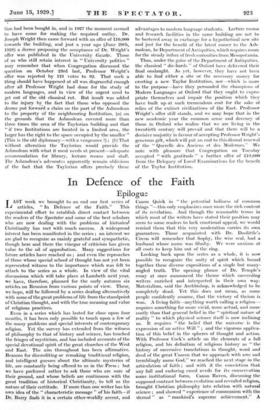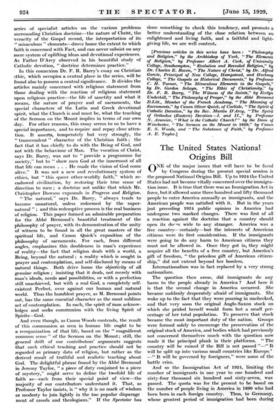In Defence of the Faith
Epilogu,s.
I AST week we brought to an end our first series of articles, " In Defence of the Faith." This experimental effort to establish direct contact between the readers of the Spectator and some of the best scholars who are now dealing with the problems of historical Christianity has met with much success. A widespread interest has been manifested in the series ; an interest we are glad to recognize as mainly grateful and sympathetic, though here and there the vinegar of criticism has given value to the oil of approbation. Many suggestions for future articles have reached us ; and even the reproaches of those whose special school of thought has not yet been represented witness to the importance which was felt to attach to the series as a whole. In view of the vital discussions which will take place at Lambeth next year, we have, therefore, planned for the early autumn six articles on Reunion from various points of view. These, we hope, will be followed by a series dealing alternatively with some of the great problems of life from the standpoint of Christian thought, and with the true meaning and value of religious practices.
Even in a series which has lasted for close upon four months, it has been only possible to touch upon a few of the many problems and special interests of contemporary religion. Yet the survey has extended from the witness of philosophy to that of history and science, has touched the fringes of mysticism, and has included accounts of the special devotional spirit of the great churches of the West and East. The aim throughout has been affirmative. Reasons for discrediting or remaking traditional religion, and intelligent guesses about the ultimate mysteries of life, are constantly being offered to us in the Press ; but we have preferred rather to ask those who are sure of their ground, and whose beliefs are continuous with the great tradition of historical. Christianity, to tell us the nature of their certitude. If more than one writer has his -own idea of the " characteristic message " of-his faith—if Dr.. Barry finds it in a certain other-worldly. accent, and Canon Quick in " the potential holiness of common things "—this only emphasizes once more the rich content of its revelation. And though the reasonable terms in which most of the writers have stated their position may seem to some readers to lack emotional appeal, we would remind them that this very moderation carries its own guarantees. Those acquainted with Dr. Doolittle's Circus will remember that Sophy, the wise seal, had a hnsband whose name was Slushy. We were anxious at all costs to keep him out of the ring.
Looking back upon the series as a whole, it is now possible to recognize the unity of spirit which bound together these diverse expositions of a single but many- angled truth. The opening phrase of Dr. Temple's essay at once announced the theme which succeeding writers enriched and interpreted in their own • way. Materialism, said the Archbishop, is acknowledged to be completely dead. Yet this does not mean, as some people confidently assume, that the victory of theism is won. A living faith—anything worth calling a religion— requires something far more vivid, more actual, and more costly than that general belief in the " spiritual nature of reality " to which physical science itself is now inclining us. It requires " the belief that the universe is the expression of an active Will " ; and the vigorous applica- tion of this belief in the spheres of thought and action. With Professor Cock's article on the elements of a full religion, and his definition of religious history as " the history of successive translations in thought, word and deed of the great Unseen that we approach with awe and tremblingly name God," we reached the next stage in the articulation of faith ; and with it the conviction that any full and enduring creed needs for its conservation some institutional form, Canon Raven, discussing the supposed contrast between'evolution and revealed religion, brought Christian philosophy into relation with natural science ; and showed " experience of communion with the eternal " as " mankind's supreme achievement." A series of specialist articles on the various problems surrounding Christian doctrine—the nature of Christ, the veracity of the Gospel record, the interpretation of its " miraculous " elements—drove home the extent to which faith is concerned with Fact, and can never subsist on any mere system of uplifting ideas and devotional experiences. As Father D'Arcy observed in his beautiful study of Catholic devotion, " doctrine determines practice." In this connexion Dr. F. R. Barry's essay on Christian ethic, which occupies a central place in the series, will be found also to possess a central significance. It divides the articles mainly concerned with religious statement from those dealing with the reaction of religious statement upon religious practice—the life of sanctity and what it means, the nature of prayer and of sacraments, the special characters of the Latin and Greek devotional spirit, what the Church is and must be, what the teaching of the Sermon on the Mount implies in terms of our own day. For other reasons, this essay seems to us to have a special importance, and to require and repay close atten- tion. It asserts, temperately but very strongly, the " transcendent " character of the Christian faith ; the fact that it has chiefly to do with the Being of God, and not with the behaviour of Man. The vocation of Christ, says Dr. Barry, was not to " provide a programme for society," but to " show men God at the innermost of all that life can mean . . . He made the vision of God come alive." It was not a new and revolutionary system of ethics, but " this queer other-worldly faith," which re- endowed civilization, by restoring their true sense of direction to men ; a doctrine not unlike that which Mr. Christopher Dawson expounds in Progress and Religion. " The natural," says Dr. Barry, " always tends to become unnatural, unless redeemed by the super- natural " ; and this redemptive process is the real business of religion. This paper formed an admirable preparation for the Abbe Bremond's beautiful treatment of the philosophy of prayer, with its demonstration of the unity of witness to be found in all the great masters of the spiritual life, and Canon Quick's exposition of the philosophy of sacraments. For each, from different angles, emphasizes this doubleness in man's experience of reality—the fact that religion deals with a world, a Being, beyond the natural ; a reality which is sought in prayer and contemplation, and self-disclosed by means of natural things. Both drive home the objectivity of all genuine religion ; insisting that it deals, not merely with man's ideals, needs and possibilities, or with a perfection still unachieved, but with a real God, a completely self- existent Perfect, over against our human and natural world. Thus the humblest prayer, as M. Bremond points out, has the same essential character as the most sublime act of contemplation. In each, the spirit of man acknow- ledges and seeks communion with the living Spirit of Spirits—God. And even though, as Canon Woods contends, the result of this communion as seen in human life ought to be .a reorganization of that life, based on the " magnificent common sense " of the Sermon on the Mount; still, the general drift of our contributors' arguments suggests that such ethical teaching and practice should not be regarded as primary data of religion, but rather as the derived result of truthful and realistic teaching about God. The delightful phrase found by the Abbe Bremond in Jeremy Taylor, " a piece of duty conjoined to a piece of mystery," might serve to define the twofold life of faith as—each from their special point of view—the majority of our contributors understand it. That, as Professor Taylor insists, is " why it is no mark of wisdom or modesty to join lightly in the too popular disparage ment of creeds and theologians." If the Spectator has done something to check this tendency, and promote a better understanding of the close relation between an enlightened and living faith, and a faithful and light- giving life, we are well content.
[Previous articles in this series have been : "Philosophy and Religion," by the Archbishop of York, " The Elements of Religion," by Professor Albert A. Cock, of University College, Southampton, " Evolution and Revealed Religion," by Dr. Charles E. Raven, " The Nature of Christ," by Dr. Alfred Garde, Principal of New College, Hampstead, and Hackney College, " The Gospels as Historical Documents," by Professor C. H. Turner, " The Miraculous Elements in the Gospels," by Dr. Gordon Selwyn, " The Ethic of Christianity," by Dr. F. R. Barry, " The Witness of the Saints," by Evelyn Underhill," The Philosophy of Prayer," by the Abbe Bremond D.Litt., Member of the French Academy, " The Meaning of Sacraments," by Canon Oliver Quick, of Carlisle, "The Spirit of Catholic Devotion," by the Rev. Martin D'Arcy, "The Spirit of Orthodox (Eastern) Devotion—I. and II.," by Professor N. Arseniev, "What is the Catholic Church?" by the Dean of Winchester, " The Sermon on the Mount in -1929," by Canon E. S. Woods, and The Substance of Faith," by Professor A. E. Taylor.]







































 Previous page
Previous page